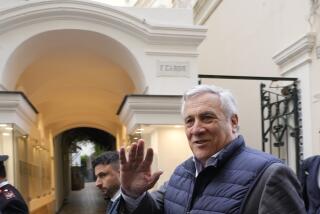Shocked Italy Debates Its Involvement in Iraq
- Share via
ROME — For weeks, Italy’s newspapers and television programs have run happy reports on Italian soldiers stationed in the quiet Iraqi south, where they gave candy to children, built schools and fixed roads. The contingent seemed relatively safe, relatively out of harm’s way.
That idyllic picture came crashing down Wednesday morning, when insurgents blew up the Italian military headquarters in Nasiriyah, killing at least 18 Italians and plunging the European country into shocked debate.
The blast was the single deadliest attack on members of the U.S.-led coalition since the war began, and these were Italy’s first hostile deaths in Iraq. After the U.S. and Britain, Italy has now lost more troops in Iraq than any other nation in the coalition.
The bombing showed that the Iraqi resistance is not confined to Baghdad or the “Sunni Triangle” north and west of the capital, and that the insurgents are attacking anyone who is -- or is perceived to be -- America’s partner in Iraq.
For Italians, it was an awful awakening.
“An ignoble act,” is how President Carlo Azeglio Ciampi condemned the bombing. Flags were ordered lowered to half-staff across the nation. People attending Parliament, union meetings and even soccer games observed a minute of silence.
Despite pleas for unity from Prime Minister Silvio Berlusconi, the nation was immediately locked in debate over whether to pull the plug on the 2,700-strong Italian mission in Iraq -- a decision that would have profound repercussions for the Bush administration, which has been desperate to get other nations to contribute forces to help stabilize the nation.
“The worst mistake we could make would be to withdraw from Iraq now,” Berlusconi told Parliament, where he and Defense Minister Antonio Martino were called to report on the bombing. Berlusconi and other senior members of his government pledged to keep the Italian contingent in Iraq, where it has been since June.
“Only by continuing the mission in Iraq will the sacrifice of these men not be in vain,” Martino said.
Some members of the center-left opposition coalition called for the troops to come home.
“The length and nature of the Iraqi mission must be reviewed,” said coalition leader Francesco Rutelli, although he stopped short of urging withdrawal: “This isn’t the moment.”
Sen. Cesare Salvi, a Rutelli coalition partner, was more blunt. “Fresh, unnecessary deaths must be avoided,” he said. “Italy must change its line.”
Italians have long been ambivalent about sending their troops into action abroad. Although the Carabinieri police and the army’s crack Bersaglieri infantrymen, distinctive in helmets topped by plumes of black feathers, have frequently participated in peacekeeping missions, it has always been under a United Nations, European Union or NATO mandate. The missions usually have been dedicated to humanitarian assistance, police training and medical care rather than combat. With polls showing a majority of Italians already opposed to the war in Iraq, it doesn’t take much to give them cold feet about the Italian presence there now.
“This will certainly bring about some serious soul-searching about what we should be doing,” said Franco Pavoncello, political scientist at Rome’s John Cabot University.
Pulling troops out of Iraq would require approval from Parliament -- where Berlusconi holds a decisive majority -- so such a move seems unlikely now. Over time, however, if pressure builds, momentum for a withdrawal could build too, analysts said.
“The government is sort of trapped,” Pavoncello said. “It cannot move out now. But on the other hand, this is not the kind of situation Italians want to find themselves in. I don’t think this is a society interested in dealing with this level of pressure.”
Italy’s Interior Ministry placed the nation on special alert after the bombing, fearing an attack at home. Over the last couple of years, a number of people alleged to have ties to the Al Qaeda terrorist network have been arrested in Italy, and last month an audiotape message surfaced -- purportedly recorded by Osama bin Laden -- threatening Italy and other nations allied with Washington.
Berlusconi said Wednesday’s carnage was essentially inevitable, given the string of attacks on U.S. allies in Iraq and on the U.N. and the International Committee of the Red Cross, which have sought to maintain independence from the occupiers.
“We will feel no intimidation,” he said. “It was our duty to participate, and we are fulfilling our duty.”
But as national television broadcast smoky, chaotic images from Nasiriyah, Ernesto Pallotta, a sergeant in the Carabinieri, offered viewers a forceful disagreement.
“After these deaths in Iraq, we have to say ‘stop’ to the mission,” he told RAI television in Rome. “The attack has touched us even more because we know that the Carabinieri were very much appreciated by the local population. Because of the benevolence of the population, we thought we would not be a target.”
More to Read
Sign up for Essential California
The most important California stories and recommendations in your inbox every morning.
You may occasionally receive promotional content from the Los Angeles Times.














